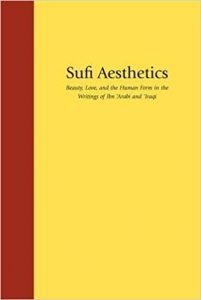نام کتاب: Sufi Aesthetics – Beauty, Love, And The Human Form In The Writings Of Ibn ‘Arabi And ‘Iraqi.
نویسنده: Cyrus Ali Zargar و Frederick M. Denny
ویرایش: ۱
سال انتشار: ۲۰۱۳
کد ISBN کتاب: ۹۷۸۱۶۱۱۱۷۱۸۳۹, ۱۶۱۱۱۷۱۸۳۰
فرمت: PDF
تعداد صفحه: ۲۴۸
انتشارات: The University Of South Carolina Press
Description About Book Sufi Aesthetics – Beauty, Love, And The Human Form In The Writings Of Ibn ‘Arabi And ‘Iraqi. From Amazon
Sufi Aesthetics argues that the interpretive keys to erotic Sufi poems and their medieval commentaries lie in understanding a unique perceptual experience. Using careful analysis of primary texts, Cyrus Ali Zargar explores the theoretical and poetic pronouncements of two major Muslim mystics, Muhyi al-Din ibn al-�Arabi (d. 1240) and Fakhr al-Din �Iraqi (d. 1289), under the premise that behind any literary tradition exist organic aesthetic values. The complex assertions of these Sufis appear not as abstract theory, but as a way of seeing all things, including the sensory world.
The Sufi masters, Zargar asserts, shared an aesthetic vision quite different from those who have often studied them. Sufism�s foremost theoretician, Ibn �Arabi, is presented from a neglected perspective as a poet, aesthete, and lover of the human form. Ibn �Arabi in fact proclaimed a view of human beauty markedly similar to that of many mystics from a Persian contemplative school of thought, the �School of Passionate Love,� which would later find its epitome in �Iraqi, one of Persian literature�s most celebrated poet-saints. Through this aesthetic approach, this comparative study overturns assumptions made not only about Sufism and classical Arabic and Persian poetry, but also other uses of erotic imagery in Muslim approaches to sexuality, the human body, and the paradise of the afterlife described in the Qur�an.
درباره کتاب Sufi Aesthetics – Beauty, Love, And The Human Form In The Writings Of Ibn ‘Arabi And ‘Iraqi. ترجمه شده از گوگل
صوفی زیبایی شناسی استدلال می کند که کلید تفسیری به اشعار صوفی وابسته به عشق شهوانی و تفسیر قرون وسطایی خود در درک یک تجربه ادراکی منحصر به فرد نهفته است. با استفاده از تجزیه و تحلیل دقیق از متون اولیه، کوروش علی زرگر به بررسی اظهارات نظری و شاعرانه از دو عارف بزرگ مسلمان، Muhyi الدین ابن عربی (م. ۱۲۴۰) و فخر الدین عراقی (د ۱۲۸۹٫)، تحت این فرض که در پشت هر سنت ادبی وجود ارزش های زیبایی شناسی آلی است. اظهارات پیچیده ای از این صوفیان به نظر می رسد به عنوان نظریه انتزاعی نیست، اما به عنوان یک راه از دیدن همه چیز، از جمله جهان حسی.
استادان صوفی، زرگر ادعا، یک چشم انداز زیبایی بسیار متفاوت از آن که اغلب آنها را مورد مطالعه به اشتراک گذاشته. Sufisms مهمترین تئوریسین، ابن عربی است، از دیدگاه غفلت به عنوان یک شاعر، جمال و زیبایی، و عاشق از شکل انسان ارائه شده است. ابن عربی در واقع اعلام نمایی از زیبایی انسان قابل توجهی شبیه به بسیاری از عارفان از یک مدرسه به غور و تعمق فارسی اندیشه، دانشکده پر حرارت عشق، که بعدها مظهر آن در عراق پیدا کنید، یکی از ادبیات فارسی ترین جشن شاعر و قدیسین. از طریق این روش زیبایی، مفروضات این مطالعه مقایسه واژگون ساخته شده نه تنها در مورد تصوف و کلاسیک عربی و فارسی شعر، بلکه دیگر استفاده از تصاویر وابسته به عشق شهوانی در اسلام نزدیک به تمایلات جنسی، بدن انسان، و بهشت زندگی پس از مرگ در قرآن توصیف AN.
[box type=”info”]![]() جهت دسترسی به توضیحات این کتاب در Amazon اینجا کلیک کنید.
جهت دسترسی به توضیحات این کتاب در Amazon اینجا کلیک کنید.![]() در صورت خراب بودن لینک کتاب، در قسمت نظرات همین مطلب گزارش دهید.
در صورت خراب بودن لینک کتاب، در قسمت نظرات همین مطلب گزارش دهید.

